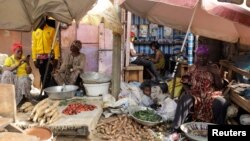Farmers’ associations from 11 Central African countries say disruptions in food supplies caused by Russia's war in Ukraine have deepened the struggles of millions of Africans to survive. The farmers, meeting Tuesday in Cameroon’s capital, called on the region's governments to help people cope with food shortages.
Farmers say scarcity, high prices and a worsening economic situation are reducing access to food for most households across central Africa.
Representatives of more than 60 farmers associations met Tuesday in Cameroon's capital Yaounde and asked the governments of 11 central African countries to invest in agriculture and ease dependency on food imports.
Nadine Mballa, coordinator of Gabon's Farmers Union, said hunger will decrease if the right steps are taken.
“We need governments in central Africa to give means, resources so that we can produce a good amount of seeds because we don't have sufficient seeds to have food sovereignty,” she said. “We need, through this conference, to sensitize our governments. If they give means, strengthen capacities of farmers, giving resources to farmers and farmers organizations because there is a need, the farmers organizations are very willing to solve food insecurity and food crisis."
Russia’s invasion of Ukraine disrupted food exports from both countries. In April, economic ministers meeting via video conferencing said the war has deprived central African states of more than 55% of wheat normally imported from both Ukraine and Russia.
Central African states say Western sanctions on Russia imposed in response to the invasion have further hurt Africa’s economy.
Drem Taing Toutkoul, coordinator of the Regional Platform of Central African Peasant Organizations, PROPAC, said if governments immediately invest in peasant farming, which he said is capable of providing 80% of food consumed by civilians in central Africa, food disruptions and price spikes will no longer be a major problem.
Toutkoul said it is unfortunate that central Africa has abundant water resources and millions of hectares of arable land, yet finds it difficult to produce cassava, maize, beans, millet, sorghum, rice and peanuts for its people. He said if the importation of planting seeds and food is not reduced, food self-sufficiency in Central Africa will remain a dream.
Cameroon, the Central African Republic, Congo, Gabon, Equatorial Guinea, Chad, Angola, Burundi, the Democratic Republic of Congo, Rwanda and Sao Tome and Principe are taking part in Tuesday’s conference.
The U.N. notes that conflict, climate shocks, floods and droughts are also contributing to central Africa's dramatic food crisis.




